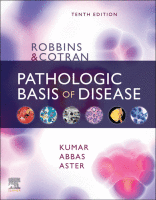Physical Address
304 North Cardinal St.
Dorchester Center, MA 02124

Many diseases are caused or influenced by environmental factors. Broadly defined, the term environment encompasses the various indoor, outdoor, and occupational settings in which human beings live and work. In each of these settings, the air people breathe, the food…

General Principles of Microbial Pathogenesis Despite the availability of effective vaccines and antibiotics, infectious diseases remain a major health problem throughout the world. In the United States and other high-income countries, infectious diseases are particularly important causes of death among…

Cancer is the second leading cause of death in the United States; only cardiovascular diseases exact a higher toll. Even more agonizing than the mortality rate is the emotional and physical suffering inflicted by cancers. Patients and the public often…

The immune system is vital for survival because it protects us from infectious pathogens that abound in the environment and from the development of cancer. Predictably, immune deficiencies render individuals easy prey to infections and increase the incidence of certain…

Genes and Human Diseases In Chapter 1 , we discussed the architecture of the normal human genome. Here we build on that knowledge to discuss the genetic basis of human diseases. Genetic disorders are far more common than is widely…

The health of cells and tissues depends on the circulation of blood, which delivers oxygen and nutrients and removes wastes generated by cellular metabolism. Under normal conditions, as blood passes through capillary beds, proteins in the plasma are retained within…

Overview of Inflammation: Definitions and General Features Inflammation is a response of vascularized tissues that delivers leukocytes and molecules of host defense from the circulation to the sites of infection and cell damage in order to eliminate the offending agents.…

Introduction to Pathology Pathology is the study of the structural, biochemical, and functional changes in cells, tissues, and organs that underlie disease. By the use of morphologic, microbiologic, immunologic, and molecular techniques, pathology attempts to explain the whys and wherefores…

Pathology literally translates as the study of suffering (Greek pathos = suffering, logos = study); more prosaically, and as applied to modern medicine, it is the study of disease. Virchow was prescient in asserting that disease originates at the cellular…